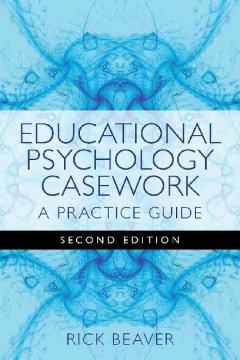
Additional Information
Book Details
Abstract
Educational Psychology Casework is a practical, accessible guide to working with children, outlining the basic skills needed and practical strategies to promote positive change and obtain the best results for children.
The book covers how to develop skills such as establishing rapport, gaining a child's trust and respect, interviewing skills and techniques, and interpreting children's responses. The author outlines the theoretical background and how this translates into practical work and includes case examples which demonstrate the theory in practice. This fully updated second edition includes new chapters on problem-solving versus solution-focused work and also on measures of impact.
This book is essential reading for all trainee and practising educational psychologists.
There is a rich compendium of techniques and ideas, which are clearly presented and illustrated by detailed case studies. I am particularly pleased to be able to review this book as I have a distinct memory of how formative it was as part of my own professional development as a newly qualified EP. This second edition retains this practical and formative quality and should continue to be valuable resource both for newly qualified and practising EPs.
The Psychologist
Rick Beaver is Assistant Principal Educational Psychologist for the Somerset Children and Young People's Directorate. He was previously Principal Educational Psychologists for the London Borough of Redbridge, and also worked for the London Borough of Newham and the Kent Educational Psychology Service. He is a Master Practitioner of Neuro-Linguistic Programming, and delivers training courses on work with children.
The second edition of Educational Psychology Casework: A Practice Guide, by Rick Beaver (Jessica Kingsley Publishers) has proven itself to be a standard text. It is a practical and straightforward guide to working with children, from which those other than psychologists can learn much.
Terry Philpot, Young Minds
The first edition of this book been a seminal text, very widely used to inform academic assignments and supervised professional practice in early years, school, family and other community settings. This second edition retains the strong, clearly presented and illustrated theoretical perspectives, outlining approaches which are now widely used in EP practice and which have proved useful in bringing about sustained change. This new edition is a valuable addition to the key reference texts which can be commended with confidence, from both academic and professional perspectives, to educational psychologists and other professionals who work with vulnerable children and young people.
Sue Morris, Director of the Educational Psychology Programme, University of Birmingham, UK
